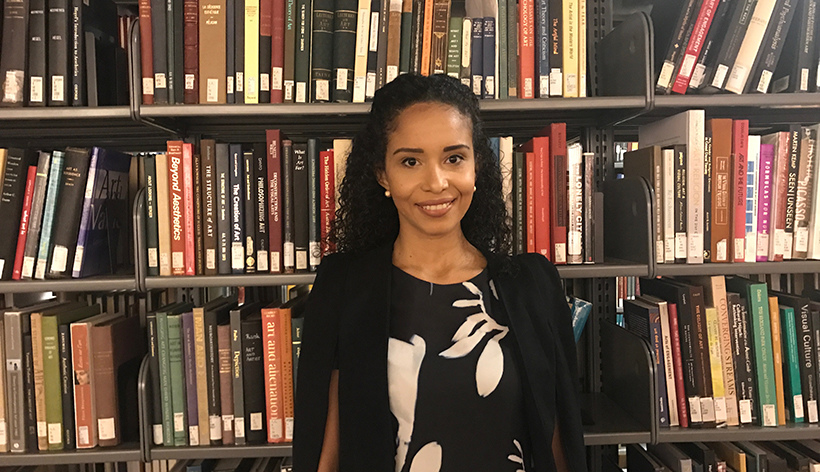News
MMFPN Graduate Funding Series: Jomaira Salas Pujols
MMFPN Graduate Funding: The National Science Foundation Graduate Research Fellowship Program

The Mellon Mays Fellows Professional Network team at Woodrow Wilson spoke with 2nd Year Rutgers Sociology Doctoral Student, Jomaira Salas Pujols (above), Bryn Mawr College ’13, to get her advice on applying to the prestigious NSF Graduate Research Fellowship Program and learn more about the research she is currently conducting under the fellowship. While many associate this award with graduate students primarily in STEM, Mellon Mays Undergraduate Fellow (MMUF) social scientists, like Jomaira, should consider this opportunity.
“Don’t say ‘no’ to yourself!” Reapply!
Due to the extremely competitive nature of the National Science Foundation Graduate Research Fellowship Program (NSF-GRFP), it is recommended that applicants reapply one or more times following a rejection. Jomaira offers this guidance to interested applicants:
My first piece of advice to Mellons is ‘don’t say ‘no’ to yourself!’ I applied for the fellowship [a second time] after being rejected last year and used the feedback from [my] first application to review and revise this year’s application. I was hesitant to [re]apply…because of how time-consuming the process is, but I did it because I realized how incredibly valuable the process is in refining your research project even if your application does not end up being funded. I figured that NSF would have to reject me again but that I wouldn’t be the one to close that door.” While NSF-GRFP has since gone on to modify its eligibility requirements limiting candidates to one application, Jomaira’s advice holds when applying to other sources of funding such as the Predoctoral Ford Foundation Fellowships, which was highlighted in our previous newsletter.
Consider the Application a Bona Fide Course and Seek Feedback
Jomaira suggests that serious candidates must commit to the lengthy and complex application process for the NSF-GRFP by carving out time to review and revise their applications: “My second piece of advice is to take the application seriously and to treat it as if it’s its own course. When I applied this year, I worked with my university’s fellowship center and received feedback from close friends [who suggested I] write multiple drafts. I made it a goal to revise my application every week and prioritized it over other responsibilities because I knew that the long-term rewards were worth it.”
Letters of Recommendation and When to Apply
Applying to the NSF-GRFP during your second year of graduate school allows graduate faculty time to get to know you and your research, resulting in more knowledgeable and stronger endorsements. Postponing the process until your second year also allows you to avoid having too many undergraduate recommenders. Jomaira suggests:
Have at least two professors in your current graduate program…write your letters. The first year I applied, I got feedback that because two of my recommenders were from undergrad, they weren’t sure how immersed I was in the program. When I applied again, I asked my advisor and another professor in my graduate program for recommendations and gave them specific feedback on the parts of my application I wanted them to highlight. The third recommendation came from a former professor and mentor in undergrad who I have kept in contact with and who I believed could speak to my trajectory as a scholar over the years.
When describing the research project she is conducting under the NSF-GFRP fellowship, Jomaira touched upon the support she received from other women of color through the Mellon network as an MMUF:
My project is about the ways in which young women of color resist and reinvent the university as a place for justice. I look at both legible forms of activism like student protest and organizing on college campuses and more creative forms of resistance like how they form spaces for support and healing with each other. My research is grounded in Black feminism with the idea that these young women live complex lives in spaces not built with them in mind, and yet they still find strategies to thrive. This idea was born out of my own experience as a woman of color in a primarily-white college campus where I wondered why stories of resilience were being obscured in favor of victim-centered narratives of failure. As a Mellon Fellow and a Posse scholar, I found wide networks of support among other women of color and I created a research project that will hopefully shed light on that experience of both communal creativity and institutional transformation.

